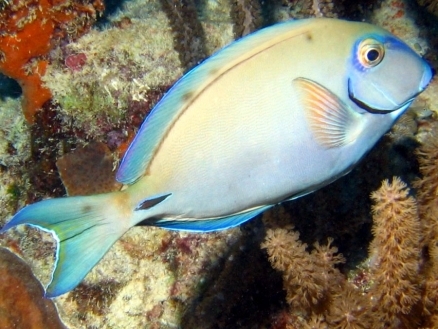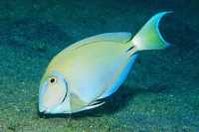Ocean surgeonfish
Contents
- 1 Introduction The ocean surgeonfish (scientific name: Acanthurus bahianus) is a member of the surgeonfish family (Family Acanthuridae) that lives on coral reefs (Ocean surgeonfish) in the Western Atlantic Ocean and the Caribbean Sea (Caribbean Sea large marine ecosystem). {| style="height: 400px" width="300" border="1" cellspacing="1" cellpadding="1" align="right" |- align="center" | Ocean surgeonfish. Source: Reef Fish Identification, New World Publications © 1994 |- align="center" | Scientific Classification Kingdom: Animalia (Animals) Phylum:--- Chordata Class:------ Osteichthyes (Bony Fishes) Order:-------- Perciformes Family:-------- Acanthuridae (Surgeonfishes) Genus:----------Acanthurus Species:----------Acanthurus bahianus (Castelnau, 1855) |}
- 2 Physical Description
- 3 Distribution
- 4 Habitat
- 5 Feeding Behavior
- 6 Behavior
- 7 Reproduction
- 8 Associations
- 9 Conservation Status
- 10 Further Reading
Introduction The ocean surgeonfish (scientific name: Acanthurus bahianus) is a member of the surgeonfish family (Family Acanthuridae) that lives on coral reefs (Ocean surgeonfish) in the Western Atlantic Ocean and the Caribbean Sea (Caribbean Sea large marine ecosystem). {| style="height: 400px" width="300" border="1" cellspacing="1" cellpadding="1" align="right" |- align="center" | |- align="center" | Scientific Classification Kingdom: Animalia (Animals)
Phylum:--- Chordata
Class:------ Osteichthyes (Bony Fishes)
Order:-------- Perciformes
Family:-------- Acanthuridae (Surgeonfishes)
Genus:----------Acanthurus
Species:----------Acanthurus bahianus (Castelnau, 1855) |}
Physical Description
Ocean surgeonfish range from 15 to 38 centimeters in length. Their oval-shaped body has uniform coloration that can vary from bluish gray to much darker. The pectoral fin often has a yellowish tint. Ocean surgeonfish derive their name from the sharp “scalpel” located at the base of their tail. A. bahianus is capable of rapidly changing colors.
Distribution
This species is distributed in the Western Atlantic from Massachusetts, USA and Bermuda southward to the Gulf of Mexico (except in the northeast) and Brazil.
Habitat
They live on coral reefs where they inhabit shallow benthic locations with coral or rocky formations.
Feeding Behavior
Ocean surgeonfish are diurnal herbivores who feed on filamentous and fleshy algae. They also consume microinvertebrates with the algae. They incidentally ingest a fair amount of inorganic material which can make up 40% of their stomach volume. They typically forage away from the reef over sand or in seagrass beds.
Behavior
Ocean surgeonfish typically forage in groups of five or more individuals.
Reproduction
Spawning may occur in pairs or in large groups (up to 20,000 individuals). Spawning occurs in the water column where the tiny eggs (0.67 mm) hatch in about 28 hours after deposition. The larvae enter the pelagic stage and they settle during the new moon, when it is darker and they are therefore at lower risk of predation, on coral patches in shallow water or in sea grass. Once the larvae reach the reef, they metamorphose into juveniles. Ocean Surgeonfish may use chemical cues to determine where they settle. After about two years individuals become sexually mature and they may live for up to ten years.
Associations
Ocean surgeonfish may form schools with doctorfish.
Conservation Status
The ocean surgeonfishis not considered to be a species at risk.
Further Reading
- Encyclopedia of Life. C.Michael Hogan, Curator. 2011. Acanthurus bahianus Castelnau, 1855
- University of Florida. 2011.Ocean Surgeon
- P.Humann and N.Deloach (Ed.) 1994. Reef Fish Identification: Florida, Caribbean, Bahamas. New World Publications, Inc. Jacksonville, FL. ISBN: 1878348078
- Deloach, N. 1999. Reef Fish Behavior, Florida, Caribbean, Bahamas. New World Publications, Inc. Jacksonville, FL. ISBN: 1878348280

